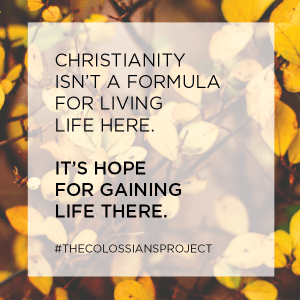Paul has spent the last seven verses teaching us one thing:
The life that we fret over — obsess over — slave for — feel guilty about — it isn’t even here anymore. It’s there.
For you have died, and your life is hidden with Christ in God (Colossians 3:3).
Our best life has been relocated to eternity. And this truth leads Paul to write the only logical call to action:
Put to death therefore what is earthly in you (Colossians 3:5).
Paul uses this challenge to open up a discussion about sin and vice in these next few verses — calling out some do’s and don’t’s of Christian behavior. But as with every call to be holy in scripture, it’s wrapped in the context of forever.
That’s because Christianity is not a formula for living life here. It’s hope for gaining life there.
Christian life is not a way to make the world work; it is grace and future glory offered because the world doesn’t work. If we call ourselves Christians only to ensure things go well on this earth, our hopes will be inevitably crushed by its limits and death and corruption.
We have used Christianity instead of longing to be with Christ.
We will imagine our disappointment is in God, but, in reality, we’ve been disillusioned by our own faulty goal. We have used Christianity instead of longing to be with Christ. We have expected healing from this world instead of in the promise of new one.
We put to death what is earthly in us only when we focus on what is unearthly about us, not on our sin. We change our behavior when we change the location of our identity from here to there. For if all my transgressions are about satisfying myself in the moment, holiness can only spring from deep knowledge that my life is hidden with Christ, and true satisfaction will be mine in the eternity of moments to come.
Jesus said Follow me. If He is my pursuit, I must stop each day and set my sights on where He actually is, preparing a place for me.
—-




0 Comments